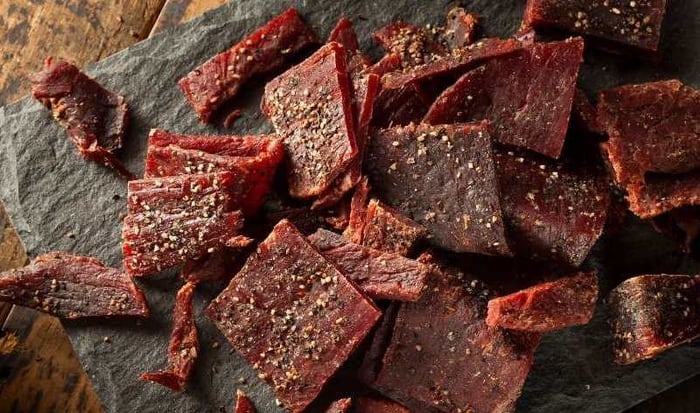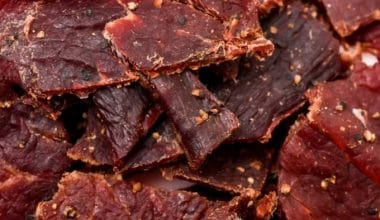Can you eat beef jerky while pregnant?
When I was pregnant, my mom told me that I couldn’t eat beef jerky because it contains nitrates. She said that they are bad for babies. Is she right?
Nitrates are naturally occurring compounds found in certain foods such as meat, poultry, fish, eggs, milk, cheese, and other dairy products. They are also added to processed meats to preserve them.
Nitrites and nitrates are natural preservatives that prevent food from spoiling. They can be found in various forms, including sodium nitrite (found in cured meats), potassium nitrate (in dried fruits and vegetables), and ammonium nitrate (used in fertilizers).
How can you prevent toxoplasmosis during pregnancy?
Toxoplasma gondii is a parasite that lives in the intestines of cats and causes infection in humans. It’s most common to get infected with T. gondii through eating undercooked or raw meat containing cysts. If your cat has been exposed to this parasite, there is a chance that you could become infected too.

The best way to avoid getting sick from toxoplasmosis is to not eat any raw or undercooked meat. You should also wash all fresh produce before eating it.
What does "pregnant women shouldn’t drink alcohol" mean?
This means that if you’re pregnant, don’t drink alcohol at all. Alcohol consumption may increase the risk of miscarriage or birth defects.
What foods to avoid during pregnancy?
Avoiding some foods will help reduce your chances of developing gestational diabetes. These include:
• Foods high in sugar – Sugary drinks like soda, fruit juice, and sweetened tea are full of empty calories that add no nutritional value to your diet. Instead, try drinking water instead.
• Processed foods – Food manufacturers often use ingredients that aren’t good for you when making their products. Avoid these by choosing whole foods over packaged ones.
• Refined grains – Whole grains contain fiber and protein, but refined grains have lost much of those nutrients. Choose whole-grain bread, pasta, cereal, and crackers instead.
• Dairy products – Milk, cream, ice cream, and yogurt are all high in saturated fat. Try replacing them with low-fat alternatives.
• Fatty red meat – Beef, pork, lamb, and veal are all high in cholesterol. Eat leaner cuts instead.
Can you eat beef jerky while pregnant?
When I was pregnant, my mother told me that I couldn’t eat beef jerky because it contained nitrates. She said they were bad for babies. Is this true?
Yes, but only if the jerky is made using a process called “nitrosation.” Nitrosated beef jerky is often used by manufacturers to extend shelf life. This process involves adding sodium nitrite to the product. Sodium nitrite is an oxidizing agent that reacts with amino acids in proteins and converts them into carcinogenic N-nitroso compounds. These compounds have been linked to cancer in animals.
However, some companies use a different method to make their jerky. The USDA requires that these companies add sodium nitrite to the final product, but they must label the package as “contains no artificial colors or flavors.”
What foods to eat during pregnancy?
You should try to eat a variety of nutritious foods every day. Here are some suggestions:
• Whole grains like oatmeal, brown rice, quinoa, wheat pasta, bread, and other baked goods
• Lean protein sources like fish, poultry, eggs, and lean red meats
• Low-fat dairy products like milk, yogurt, and cheese
• Green leafy vegetables like spinach and kale
• Legumes like lentils, chickpeas, black beans, and white beans
• Fruit like bananas, strawberries, blueberries, raspberries, grapes, and peaches
• Cruciferous veggies like broccoli and cabbage
How can I prevent morning sickness?
Morning sickness occurs when a woman feels nauseous first thing in the morning. It’s common among pregnant women. Morning sickness usually starts around week 6 of pregnancy and lasts until about week 12. Some women experience nausea throughout their entire pregnancy.
If you feel sick in the morning, try eating something light for breakfast. You may also want to drink ginger ale or ginger tea. Ginger has been shown to help reduce nausea.
If you’re feeling really sick, you might be able to take medicine to relieve your symptoms. However, there isn’t any evidence that taking medication will increase your chances of having a healthy baby. Talk to your doctor before trying any medicines.
Can you eat store-bought beef jerky while pregnant?
The answer depends on how the jerky is made. If the manufacturer uses the nitrosation process, then it’s safe to eat. But if the jerky is not nitrosated, then it contains dangerous levels of nitrates.
In addition, many store-bought jerky brands contain preservatives and additives. Avoid buying jerky from large chain stores like Walmart and Target. Instead, look for smaller local stores where you know the owners.
Can a pregnant woman eat Kilishi?
Kilishi is a popular South African snack food made from dried meat (usually beef) that’s cooked over an open fire. In fact, it’s one of the most popular snacks in Africa.
Unfortunately, there aren’t any studies showing whether kilishi poses health risks to pregnant women. However, it does contain high amounts of fat and calories. So it’s best to limit your intake of kilishi to two servings per month.
Which fruits should not be eaten during pregnancy?
Fruits are packed full of vitamins, minerals, antioxidants, fiber, and phytonutrients. They’re also delicious! Unfortunately, certain fruits can pose serious health risks to both mother and baby.
Here are some fruits to avoid during pregnancy:
• Cherries – These sweet treats have tons of sugar and little nutritional value. Eating too much could cause birth defects.
• Grapes – Too much alcohol can harm your developing fetus. Plus, grapes are a source of cyanide.
• Kiwi fruit – This tropical treat is loaded with vitamin C but also contains a toxin called furocoumarin. Furocoumarins are found in plants such as celery and parsley.
Can I eat beef jerky while pregnant?
Yes, you can eat beef jerky while you’re pregnant. The U.S. Food and Drug Administration (FDA) doesn’t regulate what goes into beef jerky. That means manufacturers don’t need to tell consumers if they use nitrosation or other processes to make their products.

However, if you buy beef jerky from a small business, you’ll probably find out more information about the manufacturing process. And because these companies are smaller, they’re less likely to use harmful ingredients.
So if you’re looking for a tasty snack, go ahead and enjoy a few pieces of beef jerky. Just keep in mind that it’s important to read labels carefully so you know exactly what you’re getting.
